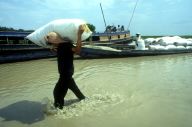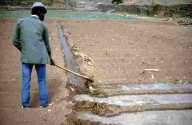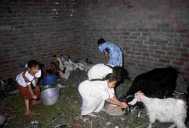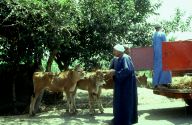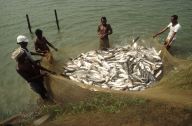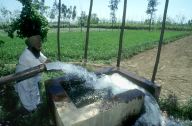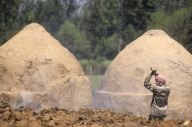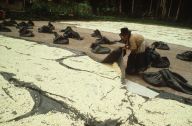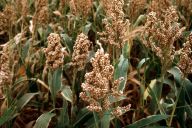FFS in picturesLogin Form |
Evolution of Farmer Field Schools in Ecuador
Historical evolution : Farmer Field Schools in Ecuador - based on Schut (2006)
Up to 25 million farm workers in the developing world suffer an incidence of pesticide poisoning each year (http://www.who.org). Over 30 years of research has shown that intensive, high external input farming has influenced and even determined rural life. In Andean countries like
Through the years both farmers and researchers acknowledged the relation between the use of highly toxic pesticides and economical, health and environmental problems in
FFS are a high order participatory approach that employs well-established principals of adult education, in-depth knowledge of agro-ecology and social organisation. The FFS-methodology is based on discovery learning, farmer-to-farmer extension and a learning process that actually takes place in the farmer’s fields, guided by facilitators. The pilot results of FFS in Carchi were impressive. The training has led farmers to increase productivity up to 40%, while reducing pesticide use by 75% (BBC Worldservice, 2004), led up to the acceptance of FFS as ‘best practice’ in Ecuador. After the FFS-pilot, National
Six years of reflective practice, studies (e.g. Paredes, 2001; Barrera et al., 2001; Barrera et al. 2004; Borja, 2004, Schut, 2006 and Tracy, 2007), and follow-up visits with FFS graduates, facilitators, and Master Trainers revealed the grey area in which FFS had disappeared. It turned out that the pesticide industry and INIAP used the FFS-concept to facilitate Safe and Correct Use of Pesticide training for women and primary school children. These contradictory events used FFS-elements in order to promote Correct Use of (highly toxic) Pesticides, which was proven to be not realistic and largely in-effective, particularly with smallholder farmers (Atkin and Leisinger, 2000). INIAP, who were closely involved in the implementation of FFS in
Besides INIAP and the pesticide industry also GOs, NGOs and CBOs took up the FFS-methodology. Research (Schut, 2006) showed that they also transformed the FFS-methodology to fit their (and their donor’s) objectives. Participatory observations show that different organisations apply the FFS-concept differently. Some FFS only consist of doing the Agro-EcoSystem Analysis (AESA) and IPM-related activities, while other FFS also contain group dynamics activities and Specific Studies. Also the way how fundamental elements – such as the AESA – were executed differs between the FFS. In some FFS the participants did not actually enter the learning plots to observe and study the crop. Decisions on the crop’s management strategy were not based on negotiation and discussion, but on the facilitator’s recommendations. Some FFS were organised in line with the normative principles, while other FFS were executed more in line with traditional, instrumental extension methods like Training and Visit. In these situations FFSs hardly contribute to increased farmer-led innovation, decision-making capacity and reduced pesticide use. These FFSs were pulled back into the pesticide-paradigm they were once supposed to challenge. Fortunately there is also very good news around FFS coming from Page Last Updated : 2024-07-31 06:53:56 Hits : 4915 Site Last Updated : 2023-11-12 12:46:26 Owner : Marc Schut |
FFSnet SearchLatest in Database |
Home  About FFSnet
About FFSnet  Countries/Networks
Countries/Networks  Directory of Country Information / FFS Networks
Directory of Country Information / FFS Networks Evolution of Farmer Field Schools in Ecuador
Evolution of Farmer Field Schools in Ecuador Historical evolution
Historical evolution
 About FFSnet
About FFSnet  Countries/Networks
Countries/Networks  Directory of Country Information / FFS Networks
Directory of Country Information / FFS Networks Evolution of Farmer Field Schools in Ecuador
Evolution of Farmer Field Schools in Ecuador Historical evolution
Historical evolution
News updates
|
Featured Pages
Evolution of Farmer Field Schools in Ecuador
Information about the History and Evolution of Farmer Field Schools in Ecuador. Click here to visit this site |
||


